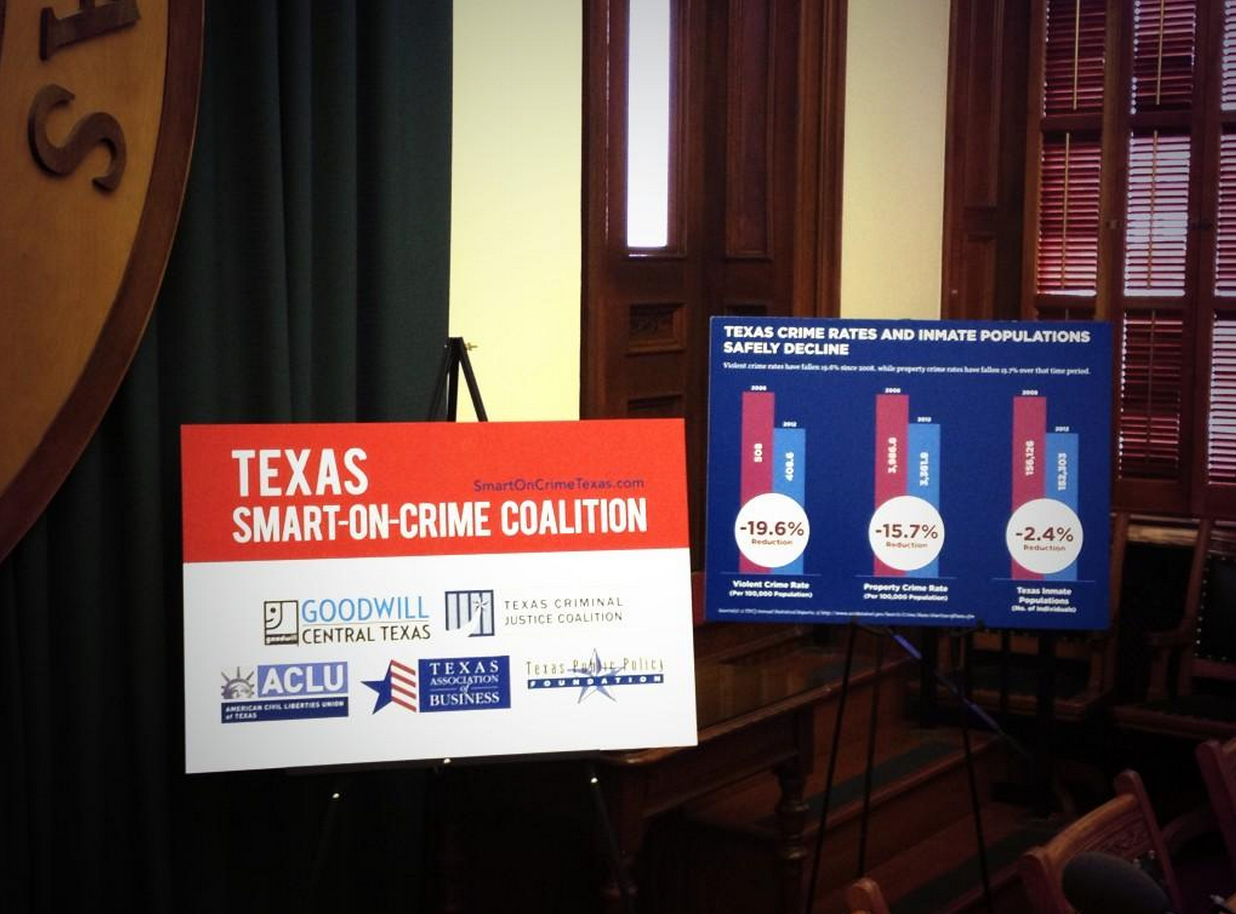
Bipartisan Coalition for Criminal Justice Reform Debuts

Above: Placards at the launch of the Texas Smart-On-Crime Coalition
We may be some four months away from the start of the 84th Legislature, but preparations are well underway. And while much of that groundwork is taking the form of opposing interest groups getting ready to beat the living daylights out of each other, a somewhat happier tale may have started yesterday at the Capitol, where an unlikely bipartisan group of criminal justice reformers gathered to launch an effort that stands a good chance of making gains next session.
For years, criminal justice reform has been one of the few bright spots at the Legislature. The state still prides itself on a tough-on-crime reputation, but recently the Legislature has rebuffed efforts to increase criminal sentences, and has provided sentencing alternatives for a range of crimes. Even Rick Perry is touting the success of the state’s drug court system. The issue fuses traditional Democratic concerns about social justice, a GOP aversion to the coercive power of big government, and some of the state’s inherent libertarian sensibilities.
But next session, legislators seem set to carry a different tune on a wide range of issues. To keep the cause of criminal justice reform advancing, advocates are launching the “Texas Smart-on-Crime Coalition.” In it, the left-leaning Texas Criminal Justice Coalition and right-leaning Texas Public Policy Foundation stand united. So do the big-money Texas Association of Business, and the central Texas branch of the non-profit Goodwill Industries. The launch event featured both Terri Burke, the head of the Texas ACLU, and Edna Staudt, a Republican justice of the peace from law-and-order Williamson County.
That’s as unusual a cross-section of the ideological spectrum as you’ll find in Texas politics. Last session, some of these groups testified in support of the same bills: This session, they’re making it official.
“This is the first time that we have officially joined forces,” says Ana Yáñez-Correa, head of the Texas Criminal Justice Coalition “And it’s beautiful to see the additions.”
The new coalition will prioritize juvenile justice issues, like decriminalizing truancy and other so-called “status offenses,” but its agenda includes a wide range of reforms throughout the system.
The coalition call for sentencing alternatives for certain offenses, like graffiti; enhancing protections for accused persons throughout the criminal justice system; repealing the widely-loathed Driver Responsibility Program; encouraging rehabilitation programs in jail; and making it easier for ex-prisoners to find work once they enter the general population. The reformers hope to win automatic expunction of arrests that don’t end in prosecution, and change occupational licensing requirements to help ex-cons get good jobs.
Yáñez-Correa has hopes that the next Legislature will be even more amenable to reform than past ones. The coalition announced yesterday is a sign that the argument on reform has been effectively won, she says.
“The criminal justice systems also represents big government,” she said, describing the embrace of reform by many GOPers in the Lege. “This is the only issue that Democrats and Republicans have been able to work together effectively on over the years.”
Many of the “agenda items were bills that were already filed last session, and made it pretty far,” she added.
The bipartisan coalition will play an especially important role next year, particularly because “we’re going to have a lot of new members,” she said. “It was really important for us to let people know that, like [the Texas Association of Business’] Bill Hammond says, this isn’t a Democrat or Republican issue.”
The hope is that the rightward tilt in the Legislature will affect these reform efforts less than it will other issues. “Last session, we had a lot of tea party members in criminal jurisprudence, and they all voted for our stuff,” she said. “Like Charles Perry. I adore that man.”
There is one thing still to be worked out: Dan Patrick, who could take control of the Senate in January, has talked loudly about decreasing the number of Democratic chairs of Senate committees. Houston Senator John Whitmire, the longtime head of Senate Criminal Jurisprudence Justice, has been one of the strongest reform advocates: Will he keep his job?
“I don’t envision Patrick removing him from that position,” says Yáñez-Correa. “He’s been there so long. I don’t know why he would.”
Whitmire’s been a great help, she says. “As he will tell you, experience matters. The man has been around for a really long time. It would be a real loss to lose him. And he’s demonstrated an ability to work with both Republicans and Democrats.”
And there will still be opposition. “For those who benefit financially from the status quo, this will be difficult for them,” she says. “And there’s still some people who think ‘The criminal justice system is there for vengeance. I don’t care about rehabilitation.’”
Still, Yáñez-Correa says, the horizon looks bright. “It’s been such a pleasure working with people who don’t necessarily hold every view that I hold,” she says. “But we’re on the same page on these issues.”


